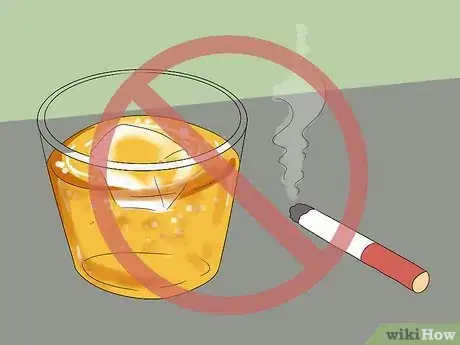This article was co-authored by Nicolette Tura, MA. Nicolette Tura is an Authentic Living Expert who operated her own wellness business for more than ten years in the San Francisco Bay Area. Nicolette is a 500-hour Registered Yoga Teacher with a Psychology & Mindfulness Major, a National Academy of Sports Medicine (NASM) certified Corrective Exercise Specialist, and is an expert in authentic living. She holds a BA in Sociology from the University of California, Berkeley and got her master's degree in Sociology from SJSU. She constantly draws from her own wounds and challenges; with her training in the healing arts and sociology, she offers potent content, powerful meditations, and game-changing seminars on inspiring elevation on a personal and corporate level.
There are 8 references cited in this article, which can be found at the bottom of the page.
wikiHow marks an article as reader-approved once it receives enough positive feedback. In this case, several readers have written to tell us that this article was helpful to them, earning it our reader-approved status.
This article has been viewed 1,065,576 times.
Being strong is not just about being physically strong. When faced with difficult circumstances, some people falter and spiral towards self-destruction while others survive and even thrive once the storm has passed. No one is completely immune to adversity, but some people seem to be better able to cope with and recover from even the most strenuous conditions. To develop your own mental, physical, or spiritual strength, follow these suggestions.
Steps
Being Mentally Strong
-
1Remember that you are in control. Strength implies having power and being able to change your own life, while weakness implies being powerless and helpless. Whatever your circumstances, there are things you can control, and things you can't. The key is to focus on the things you can control. Make a list of what is troubling you, then make a list of what you can do to make each situation better. Accept the items on the first list (they are what they are) and focus your energy on the second list.
- In studies of people with a high Adversity Quotient (AQ), it's observed that resilient people not only always find some aspect of a situation that they can control, but also feel responsible for taking action to fix the situation, even if their hardship was caused by someone else. Those with a low AQ, however, ignore opportunities to take action and deflect accountability, presuming that because they didn't create the situation, they should not be the ones to fix it.[1]
-
2Choose your attitude. Sometimes, we encounter situations in which we really are helpless to enact change. Even though these times are trying, you can still be in control because no matter what, you can always control your attitude towards life. As Victor Frankl put it: "We who lived in concentration camps can remember the men who walked through the huts comforting others, giving away their last piece of bread. They may have been few in number, but they offer sufficient proof that everything can be taken from a man but one thing: the last of the human freedoms—to choose one's attitude in any given set of circumstances, to choose one's own way." Regardless of what is happening, be positive.
- If somebody is making your life miserable, don't let them crush your spirit. Continue to be proud, have hope, and remember that attitude is something that no one can take away from you. "No one can make you feel inferior without your consent," as Eleanor Roosevelt said.
- Try not to let a crisis or hardship in one area of your life spill over into other areas of your life. If you're facing great difficulty with work, for instance, don't behave irritably towards your significant other when they've done nothing but try to help. Eliminate the side effects of your hardship by controlling your own attitude. Resilient people do not turn every setback into a catastrophe, nor do they let negative events follow a domino effect through their lives.[1]
- If it helps, remember and recite the Serenity prayer: "Grant me the serenity to accept the things I cannot change, the courage to change the things I can, and wisdom to know the difference."
Advertisement -
3Rediscover your zest for life. Emotionally strong people view each and every day as a gift. They try to structure them so that the gift is taken advantage of fully. Remember when you were a child and could get excited by the simplest wonders of life — playing with leaves in the fall, drawing a make-believe animal, eating a s'more? Find that inner child. Be that inner child. Your ability to be mentally and emotionally strong depends on it.[2]
-
4Have faith in yourself. You've made it this far. You can make it through just one more day. And if you take it just one day at a time, or even one moment at a time, you can survive whatever you're going through. It won't be easy, and you're not invincible, so take baby steps. When you feel like you're about to fall apart, close your eyes and take a deep breath. Remember these things in your quest:
- Don't listen to the naysayers. There will always be people who doubt you, for whatever reason. Your job is to not listen to them and, ultimately, to prove them wrong. Don't let them take hope away from you just because they've lost theirs. The world is practically begging you to transform it. What are you waiting for?
- Think about the times that you've succeeded. Use them as motivation in your journey. Whether it's that classroom assignment you aced, that person you talked to, or the birth of your child, let it feed your desire to be a stronger, more adjusted person. Like begets like!
- Try, try, and try again. There will come a time when you doubt yourself because you tried and failed. But failure is part of success, and everyone fails sometimes. Look up famous people who have failed multiple times before accomplishing their goals to help you get inspired.
-
5Pick your battles wisely. Does every little thing that exasperates you — a colleague asking a question, a driver cutting you off — need to? Ask yourself why and whether these things matter. Try whittling your life down to a few core values that mean the world to you, and don't worry about anything else. As Sylvia Robinson once said, "Some people think it's holding on that makes one strong — sometimes it's letting go."
Try not to take things personally. In order to protect your mind, you can't let other people ruffle you. When a situation arises where a person is pressuring you to make you do something you're not comfortable with, or they're causing you to question yourself, take a few deep breaths to center yourself. Then, let them know what you need, whether that's a minute to think about things or that they should respect that you're saying no.
-
6Reach out to the people who mean the most to you. Spend time with friends and family, along with others who are supportive and positive. If no one is available, make new friends. And if there are no friends to be found, help others who are in greater need than you are. Sometimes when we feel like we can't better our own situations, we can find strength in bettering someone else's, and we can also gain perspective on our own lives.
- There's no doubting it — humans are very social animals. Studies and science both point to social wellbeing as an important factor in emotional and physical health. If you feel like you're struggling socially, it's worth trying to get some help. Here's a start:
- Have a great conversation with someone
- Get over mistakes — don't let them define you!
- Recover after a breakup
- Overcome shyness
- Act like an extrovert
- There's no doubting it — humans are very social animals. Studies and science both point to social wellbeing as an important factor in emotional and physical health. If you feel like you're struggling socially, it's worth trying to get some help. Here's a start:
-
7Strike a balance between work and play, rest and activity. Sounds easy enough, doesn't it? It's sorely overlooked precisely because it's deceptively hard. Either we work too hard and are constantly moving around, or we slack off more than we should and lounge like hippos, idle, on the banks of opportunity. Getting a good balance between work and play, rest and activity, will allow you to appreciate each mode for what it's worth. The grass won't seem greener on the other side because you won't be boxed in just one pasture.EXPERT TIPNicolette Tura is an Authentic Living Expert who operated her own wellness business for more than ten years in the San Francisco Bay Area. Nicolette is a 500-hour Registered Yoga Teacher with a Psychology & Mindfulness Major, a National Academy of Sports Medicine (NASM) certified Corrective Exercise Specialist, and is an expert in authentic living. She holds a BA in Sociology from the University of California, Berkeley and got her master's degree in Sociology from SJSU. She constantly draws from her own wounds and challenges; with her training in the healing arts and sociology, she offers potent content, powerful meditations, and game-changing seminars on inspiring elevation on a personal and corporate level.Authentic Living Expert

 Nicolette Tura, MA
Nicolette Tura, MA
Authentic Living ExpertSmall daily goals build huge success and momentum. You need a daily practice that supports an active mind so that over time it is easier to control your thoughts and create space around them. For example, you can practice meditation for 5 minutes every day and keep increasing that when you're ready. You could also set a goal of reading one or two books every month by starting with 5-10 pages a day.
-
8Be thankful for what you have. Life is tough, but if you look closely enough, you'll find an infinite number of things to be grateful for in spite of the struggles of existence. Even if the things and people that made you happy in the past are gone, there's so much more to appreciate still. The joy you derive from the world around you is the fuel that'll push you through the hardest of times, so pay attention to what you have and enjoy it for what it's worth. Sure, you might not have that new shirt, or whatever it is you want, but at least you have this computer, with the Internet, equipped with the ability to read. At least you have this article to help you out. Some people can't read, have no computer, and are homeless. They wish they had what you did.
- Try downloading a gratitude app for your smartphone. This will remind you to write about what you are grateful for every day and help you to develop an attitude of gratitude.
-
9Don't take things so seriously. Charlie Chaplin knew something about comedy. He famously said: "Life is a tragedy when seen in close-up, but a comedy in long-shot." It's all too easy to get wrapped up in our own small tragedies that cause us to act and react on a micro level. But take a step back and look at life more philosophically, more mischievously, more romantically. The wonder, the limitless possibilities, the absurdity of it all — it's enough to make you laugh at how strangely lucky you are.
- Because, let's face it, life is just more fun when it isn't taken too seriously. And while making fun and being happy certainly isn't all life has to offer, it's an important part, right?
-
10Remember that nothing is permanent. If you’re in the middle of a period of grief or pain that you can’t control, stand aside and let the moment happen. If you are going through a prolonged period of difficulty, remind yourself that this, too, shall pass. Accept the good and the bad moments in your life for what they are and don’t get too attached to either state. Learn to let go when things get bad, and appreciate life when it is good. This will help to keep you grounded when life gets difficult.
Being Physically Strong
-
1Eat healthy. One of the biggest hurdles we face in growing physically stronger is putting nutritious, energizing food in our bodies day in and day out. We've all been there: The fast food drive-through lane beckons to us, even though we told ourselves we'd cook broccoli and fish tonight. What if we told ourselves that our lives truly depended on it?[3] [4] Would we change our eating habits then?
- Focus primarily on consuming vegetables and fruits. Supplement this part of your diet with lean proteins, such as those found in poultry, fish, dairy, nuts, and beans.
- Know the difference between complex carbs and simple carbs and prioritize complex carbs, which tend to be absorbed slower and offer more fiber.
- Prioritize healthy fats over unhealthy ones. Unsaturated fats, such as olive oil, and omega 3 fatty acids, found in salmon and flax seeds, are actually good for you in moderation.[5] Avoid unhealthy fats such as saturated and trans fats.
- Mix it up. Add variety to your diet. You want to get strong, but take pleasure in eating. Food isn't just about bulking up. Enjoying it for what it is will make you a more well-rounded individual and help you stay fitter.
-
2Exercise. Getting strong isn't just about pumping iron. It's about working with your entire body to burn fat, build muscle, and develop endurance. There are tons and tons of exercises you can try to get a full body workout, but the important thing to remember here is consistency. Exercise for at least 30 minutes every day, even if those 30 minutes are walking the dog for 20 and "stretching" for 10!
-
3Start working with weights. Building muscle will help you stay strong, but getting there is the tough part. Equal parts grueling and boring (just kidding!), weight-lifting systematically breaks down and then repairs muscle in order to make it even stronger. For more complete strength, focus on your entire body. You don't want to look like the gym-rat who only works on biceps and never makes it for leg day.
- Build muscle in your chest area
- Build muscle in your legs and thighs
- Build muscle in your arms and shoulders
- Build muscle in your core
-
4Get enough sleep. In order to rebuild muscle, reduce stress, and stay balanced emotionally, the human body needs anywhere from 8 to 10 hours of sleep per night for most adults.[6] You're not going to go breaking strength records on 4 hours of sleep. And if you don't sleep well or long enough one night, be prepared to try to sleep even more the next night, as you've built up a sleep deficit.
-
5Steer clear of so-called vices like cigarettes, excessive alcohol, and other drugs. Everyone understands that smoking cigarettes, abusing drugs, and drinking excessively is a recipe for poor health. And yet we either seem to justify it to ourselves in some way, or just conveniently forget it when the time comes to control the urge. To help you rationally control any urges, here are some statistics that put nicotine and alcohol into context:
- Almost 500,000 smokers die in the U.S. each year alone. And smokers die, on average, between 13 and 14 years younger than non-smoking counterparts.[7] That's almost a quarter of your life you're needlessly throwing away.
- 49% of murders, 52% of rapes, 21% of suicides, 60% of child abuse, and over 50% of fatal road accidents occur at least in part because of alcohol.[8]
Being Spiritually Strong
-
1Connect to a force that is greater than you. Whether that force is one of the religions' or merely the force of the universe, know that spirituality is all and only about you and your beliefs. Know that you don't have to believe in God to believe in a greater spiritual reality. Explore your beliefs, as well as those of others, and settle into a framework which you believe.
-
2Ask questions and never stop learning. Becoming spiritually "strong" and spiritually "active" aren't necessarily the same thing. The spiritually active person might adopt a belief or assume a faith and leave it at that, never questioning the faith's usefulness or tenets. The spiritually strong person asks questions about sacred texts, scrutinizes behavior, and is constantly looking for answers both inside and outside the framework of their faith.
- A spiritually strong Christian, for example, has no problem talking to an atheist and debating the finer points of Biblical orthodoxy. They might view the experience as an opportunity to learn, a refreshing departure from the usual. Their faith is usually strengthened by such an encounter, and if it isn't, that doubt is calmly and judiciously explored.
-
3Avoid judging other people for their spiritual beliefs. Imagine if you neighbor or a complete stranger came up to you and told you that your faith was completely misguided and forced you to believe in his spiritual order — all without your consent. How would you feel? Not very good, most likely. Well, that's how other people feel when proselytized or otherwise compelled to believe. Balance your own faith with your duty to your common man in as unobtrusive a way as possible.
-
4Identify blessings in your life. Most religions and spiritual orders believe in the idea of a blessing, which is help or approval from God or the universe. What's a blessing in your life?
- Try this helpful exercise for one week to hone your perception of just how many blessings you have. For seven successive days, identify a blessing that was given to you from the following:[9]
- Family member
- Neighbor
- Friend
- Work colleague
- Stranger
- Child
- Enemy
- Try this helpful exercise for one week to hone your perception of just how many blessings you have. For seven successive days, identify a blessing that was given to you from the following:[9]
-
5Help spread love from wherever you are. Spiritual strength ultimately is a form of faith that the universe is a mystery but that love between humans is self-evident. Be an agent of change and a force for good by spreading love. Whether it's a simple gesture of providing food to the homeless, smiling at a stranger, or sacrificing your well-being for the well-being of someone else, spreading love gets us all a little closer to understanding the mystery that ties us all together.
Expert Q&A
Did you know you can get expert answers for this article?
Unlock expert answers by supporting wikiHow
-
QuestionWhat if you are dealing with something that is permanent? I have diabetes, which causes me a lot of stress.
 Paul Chernyak, LPCPaul Chernyak is a Licensed Professional Counselor in Chicago. He graduated from the American School of Professional Psychology in 2011.
Paul Chernyak, LPCPaul Chernyak is a Licensed Professional Counselor in Chicago. He graduated from the American School of Professional Psychology in 2011.
Licensed Professional Counselor
-
QuestionThe other kids in my grade take advantage of me because I am nice. What can I do to be strong?
 Paul Chernyak, LPCPaul Chernyak is a Licensed Professional Counselor in Chicago. He graduated from the American School of Professional Psychology in 2011.
Paul Chernyak, LPCPaul Chernyak is a Licensed Professional Counselor in Chicago. He graduated from the American School of Professional Psychology in 2011.
Licensed Professional Counselor
Warnings
- When times are tough, we're more vulnerable than ever, and it can be tempting to do things that we would normally never consider. You might feel desperate for an unhealthy escape or validation, but such quick fixes will only make things worse. Don't turn to alcohol, drugs, or any other form of empty, temporary gratification. If you're going to escape, escape into the things that hold meaning for you, like music, reading, or art.⧼thumbs_response⧽
References
- ↑ 1.01.1Clip from Adversity Quotient (AQ), developed by Dr. Paul Stoltz
- ↑ http://www.helpguide.org/mental/mental_emotional_health.htm
- ↑ http://www.the-scientist.com/?articles.view/articleNo/37039/title/Eat-Less-and-Live-Longer-/
- ↑ http://www.medicalnewstoday.com/articles/269206.php
- ↑ http://www.hsph.harvard.edu/nutritionsource/omega-3-fats/
- ↑ http://www.sleepfoundation.org/article/how-sleep-works/how-much-sleep-do-we-really-need
- ↑ http://www.lung.org/stop-smoking/about-smoking/facts-figures/general-smoking-facts.html
- ↑ http://www.snj.com/ala-call/alacall4.htm
- ↑ http://www.vibrantlife.com/?p=199
About This Article
To be mentally strong, work on having a positive outlook in life, even when things aren't going as you wanted or planned. If someone is trying to bring you down, stay strong and remember that no one can take your positive attitude away from you. Also, even though it's not always easy, always push yourself and try again whenever you fail, since mentally strong people don't give up. For more tips from our Expert co-author, like how to be physically and spiritually strong, scroll down!















































































